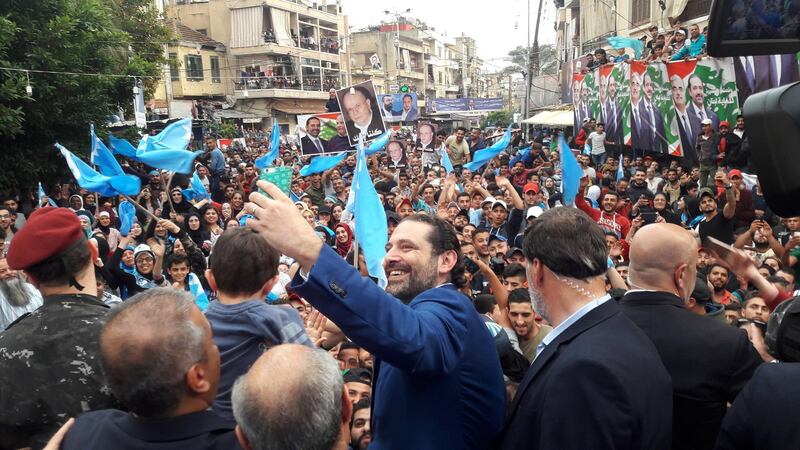With just five days until its first parliamentary elections in almost a decade, Lebanon is facing the familiar prospect of its fate being dictated by the agendas of neighbouring states, rather than its own citizens. A political crisis and war with Israel could be the result.
At the centre of the dynamic is Hezbollah, with Israel's claim on Monday that Iran lied about its nuclear programme raising regional tension combined with its reputed strikes on Iranian military bases in Syria. The blowback from Tehran may manifest itself in Lebanon, experts and political parties fighting the election say, should US President Donald Trump cancel the 2015 agreement that reined in Iran's atomic activities.
As a tiny country bearing a huge humanitarian burden from the civil war in Syria, Lebanon’s leaders have somehow managed to keep a lid on the sectarian splits that permeate its politics, and prevented the fighting from spilling into its territory. Long the battleground for regional influence, nothing major happens in Beirut without a call from Tehran, Damascus or Riyadh. The country has also been a staging point for Middle East policy among western governments
Hezbollah, a Shiite militia-cum-political party, is part of the current Lebanese government despite its fighters being heavily involved in Syria as an Iranian proxy. But the forming of a new government - a process Hezbollah politicians and its allies are central to - after Sunday’s election may shatter the calm.
"If Trump scraps the deal do you think Iran is just going to sit there and take that? I don't think so," Mohanad Hage Ali, of the Carnegie Middle East Centre, told The National, saying the first political casualty could be Lebanon's Prime Minister, Saad Hariri.
Mr Trump, long critical of the nuclear agreement, is expected on or before a May 12 deadline to refuse to certify that Iran is in compliance.
“Iran will use Hezbollah to ramp up the tension if the nuclear deal folds. If that happens I don’t see Hariri returning as prime minister. It looks like we’re heading towards an escalation,” Mr Hage Ali said.
__________
Red more:
Iran brands Netanyahu 'scandalous liar' over nuclear archive
Hezbollah blamed for attack on Lebanese election candidate
__________
Lebanon, after years of instability without a president, saw a new government formed in 2016 from a patchwork of seemingly contradictory alliances. Hezbollah backed Michel Aoun, a former general from the country’s Maronite Christian sect, as president in October 2016. And Mr Hariri, son of assassinated premier Rafik Hariri, in a shock endorsement of Mr Aoun ended the political vacuum by returning as prime minister weeks later. The election campaign has seen Mr Hariri, who heads a political grouping called the Future Movement, step up his criticism of Hezbollah, in a push to fend off increased competition for his core Sunni votes. He did so despite the working arrangement with Mr Aoun, who heads a different political party that has long been in alliance with Hezbollah.
The delicate balancing act could fall after May 12.
Salim Sayegh, a former government minister and vice president of Lebanon’s Kataeb Party, said Mr Hariri’s pact with Mr Aoun and Hezbollah had left him exposed to external powers, a reference to Iran.
__________
Read more:
In Lebanon's election, one man's place in parliament is certain
Lebanon gripped by political 'thug' row
Election fever hits Lebanon, nine years since last legislative vote
__________
“They will break Hariri whenever they want,” Mr Sayegh said. “He was completely emptied of substance by the deal he struck with the Free Patriotic Movement,” the political party that Mr Aoun founded but no longer leads. “I think the US pressure on Iran via the nuclear deal will make it even harder for Mr Hariri to resort to moderate discourse with Hezbollah.”
The parliamentary polls, the first since 2009, have been billed as a chance for the Cedar nation to re-establish its identity. A new electoral law, based on proportional representation, was billed as an effort to give a better reflection of the country’s diverse sectarian communities and offer a better chance to non-establishment candidates. But the public appears largely apathetic – experts predict turnout of less than 50 per cent – seeing the ballot as more of the same.
Lebanon’s main constituencies of Christians, Shiites, Sunnis and Druze, have leaders who hold various alliances with Syria, Iran and Gulf states, reflecting the power of outside forces.
Mr Hariri, a Sunni, became premier for a second time in December 2016 despite his longstanding opposition to Hezbollah’s political and military role.
Hezbollah’s deep involvement in Syria, at Iran’s behest, contradicts Lebanon’s official doctrine of dissociation from regional conflicts. The paradox is again being raised in the election with Hezbollah facing opposition from some independent candidates in its traditional political heartlands of east and southern Lebanon, on the Israeli border.
Bassem Shabb, an MP and close ally of Mr Hariri, conceded that if America walked away from the nuclear deal in 11 days, it would add to the chances of a regional conflict. But he said Hezbollah was under too much pressure from its Shiite base, with resources having been diverted to fighting in Syria and away from social programmes at home, to bear the risks of military engagement with Israel.
“Hezbollah, because of Iran, is interlinked with the nuclear programme. There is no doubt about that,” he said. “But any confrontation with Israel would be suicide for the Shiites in Lebanon because the Israeli action would be much harsher than last time. Israel is just trying to push Iran back.”





